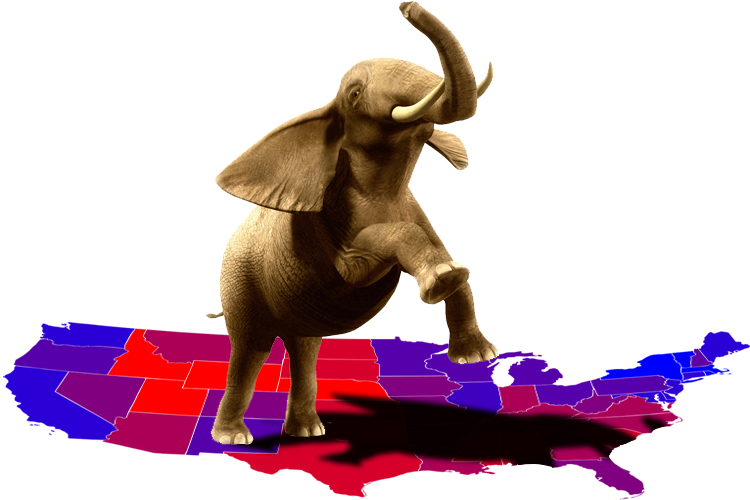The alarm on the left over a plan being promoted by some big-name Republicans in America’s sixth largest state that could cost Barack Obama the equivalent of a midsize state in the electoral college next year is understandable — but it’s probably much ado about nothing.
As Mother Jones’ Nick Baumann wrote on Tuesday, top Republicans in both houses of the GOP-controlled Pennsylvania Legislature and the state’s Republican governor (Tom Corbett) are talking up the idea of doing away with the state’s winner-take-all apportioning of electoral votes and instead divvying them up by congressional district.
Given that Pennsylvania has favored the Democrats in five state presidential elections, it seems clear which party would benefit most under this arrangement. For instance, by winning the state in 2008, Barack Obama claimed all of its 21 electoral votes. But under a district-based system, that number would have been cut to 11, since he only won nine congressional districts (he would have gotten the extra two by winning the statewide popular vote). That swing wouldn’t have mattered much in ’08, when Obama racked up 365 electoral votes, but 2012 is looking to be a much closer race — one in which a swing of a 10 electoral votes either way could make a huge difference. (Thanks to reapportionment, Pennsylvania will be down to 20 electoral votes next year.)
With Republicans controlling both the legislative and executive branches in Harrisburg, they have the power to impose a district-based plan if they want to — and as cynical as it would be, it would also be perfectly legal. And if Pennsylvania were to do it, well, then what would stop other big, Democratic-friendly states where Republicans now control state government (like, say, Michigan) from doing the same thing? Suddenly, we could be talking about dozens of electoral votes being stripped from Obama’s column in 2012 — and from Democratic nominees for years to come.
So why shouldn’t Democrats be worried?
There are several reasons. One is that state-level politicians often have interests that have nothing to do with the national scene. There’s a tendency for outsiders to look at a story like this strictly through the lens of national politics — Republicans run the state and here’s a chance for them to help Mitt or Rick, so of course they’ll do it. But changing the electoral vote rules would be a major undertaking for Republicans all over the state, one that would carry all sorts of risks and fallout that they would have to live with.
For instance, Democrats would presumably mobilize like they did in Wisconsin if the GOP were to push this plan. And while Scott Walker and the GOP ultimately got their way in Madison, it came at an enormous price: Walker’s popularity is in the tank, several state senators lost their jobs, and state government was essentially paralyzed for months. Would Pennsylvania Republicans really be willing to go to those lengths to impose something like this? Big state capitals are their own little worlds: Is the presidential race really that important to Republicans in Harrisburg? Would key county and local GOP leaders be satisfied that they and their organizations wouldn’t be hurt by fundamentally altering the way the top-of-the-ticket race is handled every four years? And how would each Republican House member feel about his or her district suddenly taking on so much importance?
Plus, there’s the law of unintended consequences. Sure, Pennsylvania has been a reliable Democratic state since 1992. But as Dave Weigel noted, it’s not like the state is permanently off-limits to the GOP. Just look at last year’s midterm elections, which swept Republicans to power in Harrisburg and handed them a U.S. Senate seat. If the economy remains in the pits through November 2012, the state should be very much in reach for the GOP presidential nominee — meaning that a district-based scheme could actually end up costing Republicans electoral votes.
This was the fear that soured Democrats in Colorado on a similar plan in that state back in 2004. That year, a wealthy out-of-state donor bankrolled a ballot initiative that would have doled out Colorado’s nine electoral votes by district. He was motivated by the results from 2000, when Al Gore lost the state but would have been lifted over the 270 electoral vote mark had Colorado used a district-based scheme. Republicans bitterly resisted the plan: The ’04 election was going to be close, and they feared that a few extra electoral votes from their state could put John Kerry over the top nationally. And when the fall rolled around and it became clear that Kerry was very much in contention to win the state outright, Democrats joined them, urging voters to defeat the proposal. The voters listened and it failed by a wide margin, with Bush winning the state — and all of its electoral votes — narrowly.
Already, there are signs of resistance among Pennsylvania Republicans. Some GOP House members from marginal districts are apparently worried that it would cause national Democrats to target their districts more intensely. The state party chairman is apparently against it, too.
It’s one thing for a tiny state like Maine or Nebraska to adopt the district-based electoral vote system. But the stakes are much higher for big states like Pennsylvania. Democrats are right to be on guard against this sort of thing; their vigilance is a reminder to Republicans of the grief they’ll face if they ever pursue it — in Pennsylvania or elsewhere. But chances are that this is as far as this idea will ever go.


